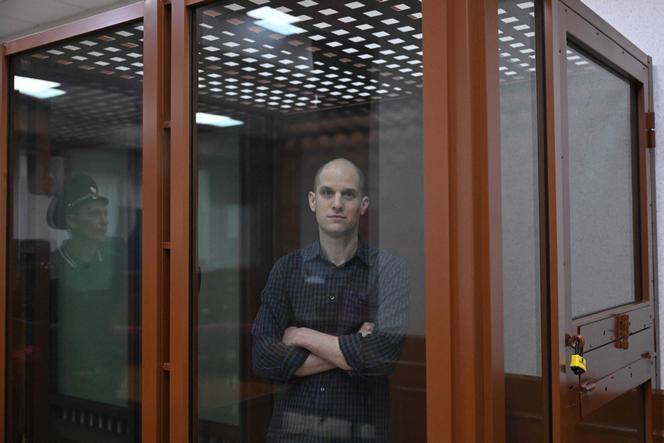


US reporter Evan Gershkovich's closed-door espionage trial in Russia began on Wednesday, June 26, 15 months after he was arrested on charges that he, his newspaper and the White House reject as false. Moscow and Washington have both said they are open to a deal to exchange the Wall Street Journal reporter, and a senior Russian diplomat said on Wednesday that the United States should "seriously consider the signals" that Russia has sent their way.
Gershkovich, 32, became the first Western journalist to be arrested for spying in Russia since the Cold War when he was detained in March 2023 on a reporting trip to the Urals city of Yekaterinburg.
On Wednesday, he was briefly shown to reporters before the trial began in Yekaterinburg's Sverdlovsk Regional Court, smiling while standing in a glass cage with a completely shaved head. He was then taken away for the start of court proceedings, held in private as is typical for espionage trials in Russia.
Russia's penitentiary service refused to disclose to Agence France-Presse (AFP) where he would be held after the proceedings or why his hair had been cut.
The Kremlin has provided no public evidence for the allegations, saying only that he was caught "red-handed." Washington says the claims are fabricated. If convicted, Gershkovich could face up to 20 years in a penal colony. He has already spent almost 15 months in Moscow's notorious Lefortovo prison since his arrest.
The Wall Street Journal has called the trial a "sham", while the US Embassy called for his immediate release. "This trial is not about evidence, due process or the rule of law. It is about the Kremlin's use of American citizens to achieve its political goals," the embassy said.
The media rights group Reporters Without Borders said there was "no evidence to support Russia's allegations." "On the contrary, there is every reason to believe that the Kremlin is holding him in order to carry out a future prisoner exchange," the group's US executive director Clayton Weimers said.
Washington has accused Moscow of arresting its citizens on baseless charges to use them as bargaining chips to secure the release of Russians convicted abroad. The Kremlin declined to comment on a possible prisoner swap Wednesday.
But hours after the trial opened, a top Russian diplomat said Moscow had sent signals to the United States about a possible deal. The US "should still seriously consider the signals that they in Washington received through the relevant channels," Deputy Foreign Minister Sergei Ryabkov told Russian news agencies, without elaborating.
Last week, Moscow said it was waiting for a response from Washington on proposals Russia had presented for a possible exchange. President Vladimir Putin has hinted he wants to see Gershkovich freed as part of a deal involving the release of a Russian man jailed in Germany for killing an exiled Chechen separatist commander. Russia has previously said it would consider a swap deal only after a verdict has been handed down.
Gershkovich's parents, who fled repression in the Soviet Union and settled in the United States in the 1970s, told AFP this year that they were counting on a "very personal promise" from US President Joe Biden to bring him home. "We know that he is innocent of what he is being accused of," his father Mikhail Gershkovich told the Wall Street Journal in a video interview in March.
Russia holds other American citizens in its jails, including marine Paul Whelan, in prison for more than five years on spying charges, and US-Russian journalist Alsu Kurmasheva, who was detained last year while visiting family.
